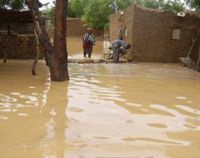
Accra, Nov. 27, GNA - CARE International, a non-governmental organisation, said on Monday it was helping 40,000 vulnerable people to jump start agricultural recovery in the northern regions through gardening, animal husbandry, and replenishing agricultural inputs. It would also assist communities and districts in developing disaster risk reduction strategies to reduce their vulnerability to climate-related disasters, including the changing rainfall patterns already noted by Ghanaian farmers, it said in a statement in Accra. The statement said the UK's Department for International Development, the Canadian International Development Agency, the United Nations Development Programme and CARE Denmark was providing funding for the projects.
Heavy rains of about 250 mm in three days, equal to one-third the average total annual rainfall in the region, and the opening of a spillway in Burkina Faso washed away tens of thousands of people's livelihoods in the three poorest regions in Ghana in August and September.
"People used a variety of coping strategies, most obviously strong social networks, to survive," the statement quoted Ms Marcy Vigoda, CARE's Mission Director for Benin, Ghana, and Togo, as saying. "But in addition to immediate aid, they need medium-term assistance to help them retrieve their livelihoods and improve their situations. CARE's agricultural recovery program aims to make people more resilient to future natural disasters."
She said CARE responded with immediate food distributions, and was now assessing the damage to livelihoods community-by-community, finding out who needed assistance and learning about which coping strategies worked and which did not. "We'll use that information to promote the best risk reduction strategies for northern Ghana," explained Mr Amadou Sayo, CARE's Regional Emergency Coordinator.
Most people in the affected areas are farmers who were already living below the poverty line - 52 per cent in the Northern Region, 70 per cent in Upper East and 88 per cent in Upper West - earn less than a dollar a day.
CARE said before the floods, it was implementing six projects focusing on improving agriculture and natural resource management in collaboration with local partners and government. CARE International employs a broad emergency response strategy that includes both emergency relief and disaster risk reduction activities so it can respond appropriately to disasters ranging from this year's flooding in Africa to the recent cyclone in Bangladesh.